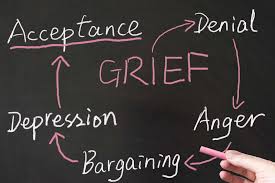There are forbidden duels
Intertwining the threads of our emotions after a loss is essential to develop the grief. However, this is not always socially permitted and the consequences of it are dire for the bereaved.

There are forbidden duels. There are losses that it is not well seen to cry and that are not socially understood. They are the so-called unauthorized duels and represent a source of discomfort as intense as it is difficult to identify.
Why? Because society, in addition to not facilitating the expression of suffering, can punish it and, therefore, force us to repress the manifestation of our feelings, our sorrow and our need for emotional withdrawal. This reality is very unknown, which means that sometimes we do not even know how to verbalize what is happening to us and we get into a spiral of discomfort, irascibility, anger with the world or deep sadness.
"In the midst of my confusion, a strong impulse for freedom sometimes assails me: simply to let you go. No longer wait for the letter that does not arrive, the phone call that does not ring, the word of regret that is not pronounced. How many advantages has letting you go! More time for me and my friends, fewer sleepless nights, less insomnia, more projects, more joie de vivre ... How easy it is to let you go ...! Yet this very thought takes my breath away! "
-Jean Monbourquette-
What situations can lead to an unauthorized duel?
As we always indicate, there are many types of losses and every loss brings us into a grieving process. A grieving person can become such because of the loss of a loved one, because of a sentimental breakup, because of the loss of an animal, because of the loss of a job, because of the loss of an unborn child, etc.
There are situations that lead us to the path of tears , but there are also many conditions that can prevent us from letting them flow. In an unauthorized grief, the rejection of the environment towards the pain that the person experiences is evident. In the case of mourning for a death, there are duels that are not allowed because the person is not considered to have such a strong bond with the person who has left.
Other times, that union may not be considered legitimate, eliminating the person's right to express their discomfort from the beginning. This can occur, for example, in those cases in which there is an extramarital affair and the lover is the bereaved.
Another common unauthorized grief situation is one in which a person's grief over the death of their pet is questioned or rated. There are many people, usually those who are unaware of the bond that is established with an animal, who ridicule and trivialize this suffering.
Let us also point out that there may be forgotten mourners also by gender. As we know, traditionally the man is denied the possibility of emotional expression.
Taboo situations or topics also lead us to enter the world of unauthorized grief. There is no talk of an abortion, be it spontaneous, be it chosen or be it provoked. They do not talk about the loss of a capacity, they do not talk about divorce or the loss of their life project. And since it is not spoken because it hurts and because it is scary, a context of emotional validation is not generated .
We exercise as authority, even if we are not
As we can see, there are many situations that can lead us to repress our feelings in the face of our social environment and, in turn, to feel a tremendous internal storm. Sometimes we are the ones who do not allow it and we delegitimize the pain without waiting for the contribution of others, while the environment does not even realize it.
However, this suffering, this grief, can be complicated by external invalidation and this has devastating consequences on mental health. Many times the judgment of others is the one that tries to determine the absence or presence of emotional pain and, also, what degree of regret can be had. But, how is it possible that people come to consider ourselves the emotional authority of someone's life?
If we think about it, it is tremendously devastating. A person can generate an unauthorized grieving process with a word, a gesture, or an absence of action. However, this dynamic is the general trend.
Society dictates to us, depending on the prevailing values in it, what we can or cannot do. In the West, the norm leads us to emotional control and the almost total repression of negative emotions and feelings.
The situation of normative loss is one of the few in which suffering is allowed to manifest. But this "exception" does not stop wearing the corset and we are told in a veiled way how and for how long we can cry and express ourselves in pain.
The emotional pain and the consequences of not letting it flare up
Psychologists see in consultation a multitude of processes that are linked to a non-elaborated duel because it is an unauthorized duel. This occurs because the human being needs to let suffering sprout, make it manifest, and gather in that emotional experience to which loss leads us. When it is not identified or repressed, the consequence is that that pain remains hidden under our mental carpet for months or years, hurting us day after day and generating various problems that escape our understanding.
In general, research shows us how words of encouragement, comforting messages, guidance and emotional support received from our closest social environment play a fundamental role in maintaining and promoting health and in the elaboration of situations painful (Neimeyer, 2002; Cabodevilla, 2007; Costa and Cabanillas, 2013).
In fact, as the research carried out by Villacieros et al (2014) shows , those people in grief contexts in which emotional ventilation is not favored end up being in a position of greater vulnerability and requiring specific psychological attention.
When people are sad or restless, we need comfort, emotional support, and a validating context. When we do not have it, the tendency will be to deny it, to repress it or to hide it.
In the case of deaths, participating in the agreed farewell rites or generating our own rites helps us to go through the pain of the initial shock to get to the idea that the relationship with that person from that moment will transcend the material and it will become spiritual. In this and other cases, we will need to talk about how we feel, what we have lost, and how we are going to function from that moment on.
Obviously, the particularity of each loss will lead us to create different coping strategies for the situation. Depending on the nature of the injury, it will be more appropriate to move towards coping focused on solving the problem or towards coping focused on emotion.
Be that as it may, what surrounds a taboo duel is a complex web whose tangle of pain is kept deferred in our lives until we allow ourselves to rescue the pain , observe it, examine it and attend to it. Sometimes, in order to achieve this, we need professional help and that, without a doubt, is a great first step towards healing.
Mentalizing solutions to problems
When we reason about a problem, we tend to use a simple and useful outline most of the time. This way of thinking is what is known as linear thinking.
Coercive persuasion is a cognitive mechanism that operates through false beliefs and misconceptions. It leads a victim to think that it is desirable and convenient to perpetuate the bond that he maintains with his aggressor.
Emotional dependency in relationships
In couple relationships there is always a certain degree of commitment and, of course, seeking the company of the person you love. However, some people have an excessive emotional dependence on their partners .



